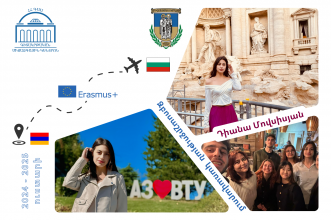Erasmus+ Success Story: Diana Movsisyan, Bulgaria
October 24, 2025
Diana Movsisyan, a 2025 outstanding graduate of the “Tourism Management” program at the International Scientific-Educational Center of the National Academy of Sciences of Armenia (ISEC NAS RA), studied for one semester in Bulgaria at the St. Cyril and St. Methodius University of Veliko Tarnovo through the Erasmus+ Student Mobility Program. In this interview, Diana shares her impressions.
– Diana, how eager were you to participate in ISEC NAS RA’s student mobility program?
– Joining the mobility program was something I was really excited about, because I was sure it would bring me one step closer to my dreams, especially in terms of professional growth.
– Why did you decide to participate in the mobility program?
– My participation was very spontaneous. I just read the announcement and immediately realized I needed to apply and do everything I could to seize this unique opportunity. I understood that this program would allow me to broaden my perspective, explore new cultures, represent Armenia, and learn about new educational methods.
– What spiritual or intellectual values did you take with you to represent Europe?
– From the very beginning, I thought it was important to represent Armenia with dignity in Europe and to share my culture and traditions. I genuinely had the opportunity to introduce my country to my international classmates and to provide them with an overview of Armenian universities’ educational programs and teaching methods.
– What did you see at the host university, in Bulgaria, and in the cities you visited during your stay?
– At the Bulgarian university, I saw a new methodology that allowed students to perform professional tasks more practically, creating realistic projects both alone and in groups. I also had the chance to meet people from different countries, which made the classes even more engaging, especially during group activities.
– What did you gain from the host university?
– I gained both theoretical and practical knowledge, which helped me understand my field more deeply. I also improved my analytical thinking skills and became more independent.
–How was this knowledge and experience delivered?
– In each course, practical work took priority, which I believe is essential in education. Practical knowledge helps us create clear strategies in our field and become flexible professionals who can succeed in a competitive market.
– Did you gain more theoretical knowledge or practical skills?
– As I mentioned, the practical part was dominant, but we also gained theoretical knowledge—mainly through various readings and discussions.
– What intangible values, like knowledge, abilities, skills, ideas, or emotions, did you bring back with you?
– A year has passed, but I still remember those five months with great warmth and nostalgia. For me, those moments brought indescribable feelings—everything was so beautiful. I returned with new ideas about promoting culture and introducing innovative concepts in tourism, which I hope, God willing, will come to fruition soon.
– What is the title of your master’s thesis, and how did your time in Bulgaria influence its preparation?
– The title of my thesis was “Prospects for the Development of Enotourism in Armenia.” During my stay in Bulgaria, I indirectly gained the chance to visit wine-producing countries such as Italy and France, where I learned about local wine culture and marketing techniques. Later, I used these experiences to compare and analyze my research topic more thoroughly.
– Comparing yourself before and after your stay in Bulgaria, what changes would you note?
– After returning from Bulgaria, I became more mature in my thinking and calmer in character—a trait I learned from them. Living independently greatly enhanced my self-reliance, personal stability, financial literacy, and time management skills. During that time, I stepped out of my comfort zone, found myself in “uncomfortable” environments, and realized that such experiences help us discover who we truly are—our potential and capabilities.
– How important is it for Armenian students to participate in mobility programs?
– I think these programs are crucial. First, they allow you to represent your country and its history, and meeting you often sparks foreigners’ interest in Armenia. At the same time, we ourselves become part of a new culture and discover new aspects of our own identity.
– How satisfied are you with your participation in this program?
– I can consider this program one of the most important milestones of my life, one that I believe I completed with honor. I am deeply grateful to the Erasmus+ program and to ISEC NAS RA for providing me with this valuable opportunity that has greatly contributed to my career growth.
– Now that you are a graduate, what role did your Erasmus+ participation play in your career development?
– Before the program, I worked as a tour guide at a museum. The Erasmus+ experience helped me better understand tourists' needs and the subtleties of presenting cultural heritage. After returning from Bulgaria and earning my master’s degree with honors in “Tourism Management” from ISEC NAS RA, I had the chance to focus my career in a more specialized direction and find my ideal job. During the hiring process, both my specialized academic background and my international experience were key factors that helped me stand out among other candidates.
– What advice would you give to students who haven’t participated yet or are unsure about joining such programs?
– I advise all students, if given the chance, not to hesitate—definitely participate in such programs, step out of your comfort zone, and aim to become the best version of yourself. I believe that programs like Erasmus+ make that possible.
Interview conducted by:
Heghine Melkonyan, Head of the Public Relations
and Career Department, ISEC NAS RA

